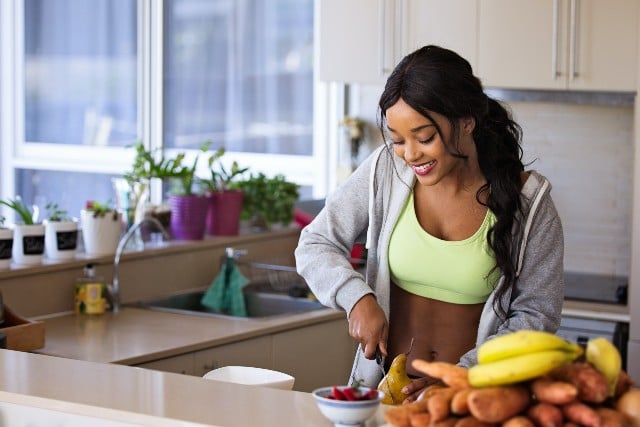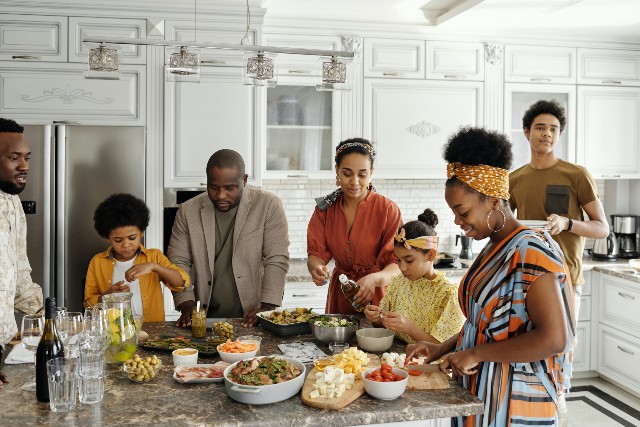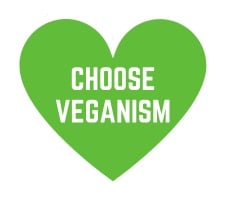As the world gradually transitions towards veganism, clued-up teens are often the ones leading the way. As they learn the benefits of a vegan lifestyle on their health, animal welfare and our planet, more and more young people are going vegan.
But, becoming vegan can be hard. And anyone who lives with non-vegan parents will have extra challenges to face. This article provides a step-by-step guide to becoming vegan as a teenager.

1. Educate yourself
The most important thing to do before you decide to go vegan is to educate yourself. Find out why people go vegan and cement in your brain your own reasons for wanting to adopt a vegan diet and lifestyle.
If your reasons for wanting to be vegan are mainly to look cool, fit in with your friends or follow a trend, then you’re not likely to stick to it. And you won’t gain the respect that vegans deserve.
Whether your focus is on animal suffering, preserving the planet or improving your health, it’s a good idea to learn about all of the benefits of being vegan.
Good places to learn about veganism include:
Documentaries are generally the best way to learn about the benefits of going vegan. YouTube videos and blogs are great places to learn about how to cook vegan food.

Suggested read: How easy is it to go vegan?
2. Talk to your parents
Once you’ve done lots of research and are serious about going vegan, it’s time to get your parents on board.
Tell them about what you’ve learned and why you want to go vegan. You could ask if they would consider sparing an hour to watch one of your favourite vegan documentaries with you.
If your parents aren’t keen to watch animal suffering and would prefer to turn a blind eye to cruelty, then choose a documentary such as Forks Over Knives which focuses on the health benefits of a plant-based diet.
If your parents aren’t on board, don’t force it. Just let them know that it’s something that you’re thinking about and that you’d like to be more involved in the kitchen.
Wanting to be healthier and wanting to help with the cooking are both things that are hard to disagree with.

3. Take it slowly
Going vegan overnight is almost always a bad idea because it can cause unpleasant side effects. The slower you can take your transition, the better.
If you’ve been eating meat and fish, your first step would be to go vegetarian. After that, start making small changes like trying different plant-based milks and making an effort to pay attention to food labels.
As much as going vegan is about giving things up, it’s also about eating new things. If you gave up all the animal-based food and didn’t add anything new you’d be pretty miserable! So aim to try a new fruit or vegetable each week.
Want to go vegan in just 28 days? Find help from the One Month Vegan Challange.
4. Learn to cook
Being vegan without knowing how to cook is pretty much impossible. Yes, vegan ready meals are available, but they’re often expensive – they’re certainly not a long-term solution.
Helping out in the kitchen is a great way to get your family on your side. You don’t need to eat different meals from everyone else if you get involved with the cooking so that you can make a vegan version for yourself.
For example, if you’re dad is making spaghetti bolognese for the family, ask that he put some aside before he adds the meat so that you can add your own lentil ragu.
If you’re looking up recipes, try to keep it simple. You’ll find lots of vegan recipes with just 5 ingredients online.
Suggested read: How to become vegan when you’re a picky eater.

5. Learn to read labels
Most vegan food doesn’t actually say vegan on the packaging, so you’ll need to learn how to read labels. Once you’ve mastered this skill, you’ll be able to know if something is vegan quite easily. You’ll soon build up a mental list of what’s suitable for vegans and what’s not.
Knowing which cosmetics and household products have been tested on animals is a bit trickier. If you see a bunny logo on the packaging, you’ll know that it’s okay. Other times, you might have to Google the company name to find out for sure.
As a new vegan, it’s a good idea to focus on the food first and then you can move on to boycott animal testing later.
6. Get involved in the grocery shopping
Presenting your parents with a list of things for them to buy might not go down too well. Their first thought might be, ‘How much is all this special food going to cost?’
Instead, offer to come with them to the supermarket, so that you can see for yourself how much things cost and make decisions together about what to buy each week.
Plan your meals for the week ahead so that you only buy what’s needed and don’t waste any food.

7. Carry snacks with you
There won’t be any vegan options available everywhere you go. It’s always wise to have a piece of fruit or a cereal bar in your bag so that you never have to go hungry.
8. Take a vitamin supplement
It can be tricky to get enough vitamins and minerals on a vegan diet, so be sure to take a supplement that includes vitamin B12, vitamin D, calcium, iron and zinc.
Suggested read: The Best Multivitamins for Vegans
If you miss out on vital nutrients as a teenager, this could have lasting effects for the rest of your life, so it’s important to make sure that you get everything you need.
If you eat a healthy, balanced vegan diet you can get all the nutrients you need except for B12. The easiest way to supplement this is by adding nutritional yeast to your food.
9. Don’t preach
Recognise that not everyone has the same principles as you, and it’s not your job to convert them.
Preaching hardly ever works, all it does is alienate people. The more you stress your point, the more people will dig their heels in and have the opposite viewpoint.
Instead, just focus on your own journey, but be ready to answer questions if anyone asks.

10. Listen to your body
Listening to your body’s messages will make sure that all your physical and psychological needs are met. Eat when you’re hungry and stop eating when you’re full. If exercise gives you energy, work out. If you need rest, make sure you get it.
When you first go vegan, it’s common to crave non-vegan foods. It could just be that your body is in need of more protein or a particular vitamin. Consider how you can get these, and don’t be discouraged if you need to take your vegan transition a little slower than you had planned.
The slower you are along your vegan journey, the more likely you are to stay vegan for life and the bigger impact you will have in the long run.
Conclusion
Having a plan for how to go vegan as a teenager is a great first step. When going vegan, remember that it’s common to fail many times before becoming fully vegan. If this happens, don’t worry about it at all.
Every vegan meal you eat will make a difference, so keep at it, and you’ll get there in the end.
And if you’re in need of some more help, take a look at the One Month Vegan Challenge.
